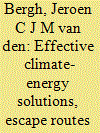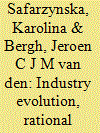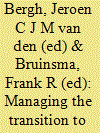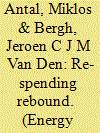|
|
|
Sort Order |
|
|
|
Items / Page
|
|
|
|
|
|
|
| Srl | Item |
| 1 |
ID:
171524


|
|
|
|
|
| Summary/Abstract |
A widespread implicit assumption is that renewable energy options are approximately low-carbon. However, production and life cycles of such technologies tend to produce CO2 emissions. To minimize life-cycle emissions, one should account for such emissions and implement adequate policies to encourage innovation and adoption of well-performing technologies in this respect. We develop a framework to analyse this issue, grounded in the concepts of ‘energy return on energy invested’ (EROI) and ‘net energy return on carbon invested’ (EROC). Applying these to the main PV technologies and production regions – namely China, EU and USA – displays considerable discrepancies. We conditionally predict the development of average EROI and EROC over time under business-as-usual and low-carbon electricity generation scenarios. A main policy lesson is that without a systemic policy instrument, such as carbon pricing, incentives for low-carbon production of renewable energy options are too weak, which likely will delay a complete transition to a low-carbon economy.
|
|
|
|
|
|
|
|
|
|
|
|
|
|
|
|
| 2 |
ID:
112932


|
|
|
|
|
| Publication |
2012.
|
| Summary/Abstract |
Many well-intended climate-energy strategies are ineffective in the absence of serious environmental regulation. This holds, among others, for direct support of clean energy, voluntary energy conservation, technical standards on a limited set of products, unilateral stringent carbon pricing, and awaiting peak oil as a climate strategy. All of these suffer from "escape routes" that indirectly increase CO2 emissions and thus make the original strategy ineffective. On the other hand, environmental regulation alone may lead to a myopia-bias, stimulating early dominance of cost-effective technologies and a focus on incremental innovations associated with such technologies rather than on radical innovations. Although adopting a partial viewpoint keeps the analysis simple, we urgently need a more inclusive systems perspective on climate solutions. This will allow the formulation of an effective climate policy package that addresses the various escape routes.
|
|
|
|
|
|
|
|
|
|
|
|
|
|
|
|
| 3 |
ID:
109685


|
|
|
|
|
| Publication |
2011.
|
| Summary/Abstract |
Guiding a transition to low carbon electricity requires a good understanding of the substitution of old by new technologies in the electricity industry. With the aim of explaining historical change from coal to gas in the British electricity industry, we develop a formal model of technological change, where energy technologies diffuse through the construction of new power plants. We considered two model versions: with rational and boundedly rational investors. In each model version, we look at the causal relations between price and output setting mechanisms, fuel and labour use, and investment decisions for different institutional arrangements. We quantify model parameters on data for the United Kingdom. We find that the version of the model with rational investors is capable of replicating well core features of UK electricity history. This includes a rapid diffusion of gas in electricity production, the evolution of the average size of newly installed plants, and a high percentage of electricity sales covered by (forward) contracts-for-difference. In this model setting, nuclear and renewable energies have no chance to diffuse on the market. In the version of the model with boundedly rational investors, nuclear power typically dominates electricity production. We discuss implications of our modelling results for making a transition to low carbon electricity in the future.
|
|
|
|
|
|
|
|
|
|
|
|
|
|
|
|
| 4 |
ID:
083318


|
|
|
|
|
| Publication |
Cheltenham, Edward Elgar, 2008.
|
| Description |
xi, 385p.
|
| Standard Number |
9781847202291
|
|
|
|
|
|
|
|
|
|
|
|
Copies: C:1/I:0,R:0,Q:0
Circulation
| Accession# | Call# | Current Location | Status | Policy | Location |
| 053861 | 333.79/BER 053861 | Main | On Shelf | General | |
|
|
|
|
| 5 |
ID:
133306


|
|
|
|
|
| Publication |
2014.
|
| Summary/Abstract |
It is well-known that energy conservation can lead to rebound effects that partly offset the original energy savings. One particular rebound mechanism is re-spending of money savings associated with energy savings on energy intensive goods or services. We calculate the average magnitude of this "re-spending rebound" for different fuels and countries, and for both energy and carbon (CO2) emissions. We find that emerging economies, neglected in past studies, typically have larger rebounds than OECD countries. Since such economies play an increasingly important role in the global economy the re-spending rebound is a growing concern. The re-spending effect is generally larger for gasoline than for natural gas and electricity. Paradoxically, stronger financial incentives to conserve energy tend to increase the rebound. This suggests that with climate regulation and peak oil the re-spending rebound may become more important. We discuss the policy implications of our findings.
|
|
|
|
|
|
|
|
|
|
|
|
|
|
|
|
|
|
|
|
|